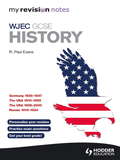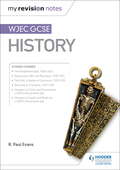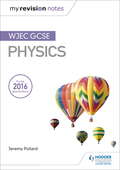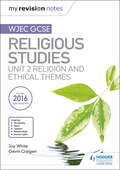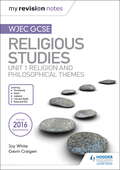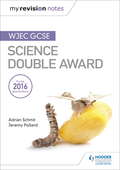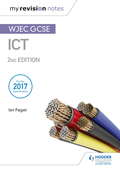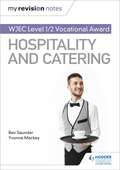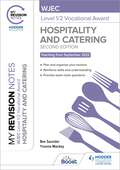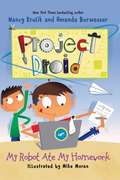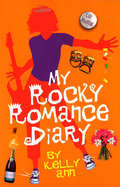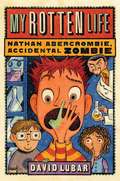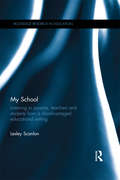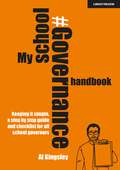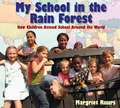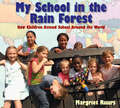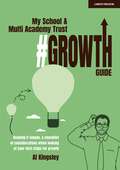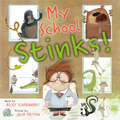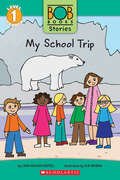- Table View
- List View
My Revision Notes WJEC GCSE History
by R. Paul EvansMy Revision Notes: WJEC GCSE History is designed to consolidate knowledge and understanding of the WJEC History GCSE and thoroughly prepare students for their exams. It covers the four topics of Germany 1929-1947, USA 1910-1929, USA 1929-2000 and Russia 1914-1924. It includes: - preparation for the examination including revision techniques- a summary of the key course content, including key terms and key issues- examiner tips on how to tackle the exam questions- revision tasks and exam practice throughout each topic.
My Revision Notes: WJEC GCSE History (My Revision Notes)
by R. Paul Evans Rob QuinnExam board: WJECLevel: GCSESubject: HistoryFirst teaching: September 2017First exams: Summer 2019Target success in WJEC GCSE History with this proven formula for effective, structured revision. Key content coverage is combined with exam preparation tasks and practical tips to create a revision guide that students can rely on to review, strengthen and test their knowledge.With My Revision Notes every student can:- Plan and manage a successful revision programme using the topic-by-topic planner- Consolidate subject knowledge by working through clear and focused content coverage- Test understanding and identify areas for improvement with regular revision tasks- Improve exam technique through practice questions and tips from an expert author, teacher and examiner- Get exam ready with answers to the practice questions available online- Learn and use key terms for each topicThis revision guide covers the following studies:- The Elizabethan Age, 1558-1603- Depression, War and Recovery, 1930-1951- Germany in Transition, 1919-1939- The USA: A Nation of Contrasts, 1910-1929- Changes in Health and Medicine in Britain, c1340 to the present day- Changes in Crime and Punishment in Britain, c1500 to the present day
My Revision Notes: WJEC GCSE Physics
by Jeremy PollardExam Board: WJECLevel: GCSESubject: PhysicsFirst Teaching: September 2016First Exam: Summer 2018Target success in Science with this proven formula for effective, structured revision; key content coverage is combined with exam-style tasks and practical tips to create a revision guide that students can rely on to review, strengthen and test their knowledge.With My Revision Notes, every student can:- Plan and manage a successful revision programme using the topic-by-topic planner- Consolidate subject knowledge by working through clear and focused content coverage- Test understanding and identify areas for improvement with regular 'Now Test Yourself' tasks and answers- Improve exam technique through practice questions, expert tips and examples of typical mistakes to avoid- Get exam ready with extra quick quizzes and answers to the practice questions available onlinePlease note that some of the quizzes from the WJEC GCSE My Revision Notes series are also used in the WJEC GCSE Teaching and Learning resources.
My Revision Notes WJEC GCSE Religious Studies: Unit 2 Rel And Eth Themes Epub
by Gavin Craigen Joy WhiteTarget success in WJEC GCSE Religious Studies with this proven formula for effective, structured revision; key content coverage is combined with exam-style tasks and practical tips to create a revision guide you can rely on to review, strengthen and test their knowledge.With My Revision Notes you can:- Plan and manage a successful revision programme using the topic-bytopic planner.- Consolidate subject knowledge by working through clear and focused content coverage.- Test understanding and identify areas for improvement with regular 'Now Test Yourself' tasks and answers.- Improve exam technique through practice questions, expert advice and examples of typical mistakes to avoid.
My Revision Notes WJEC GCSE Religious Studies: Unit 1 Religion and Philosophical Themes
by Joy White Gavin CraigenExam board: WJECLevel: GCSESubject: Religious StudiesFirst teaching: September 2017First exams: Summer 2019Target success in WJEC GCSE Religious Studies with this proven formula for effective, structured revision; key content coverage is combined with exam-style tasks and practical tips to create a revision guide you can rely on to review, strengthen and test students' knowledge.With My Revision Notes, every student can:- Plan and manage a successful revision programme using the topic-bytopic planner.- Consolidate subject knowledge by working through clear and focused content coverage.- Test understanding and identify areas for improvement with regular 'Now Test Yourself' tasks and answers.- Improve exam technique through practice questions, expert advice and examples of typical mistakes to avoid.
My Revision Notes WJEC GCSE Religious Studies: Unit 2 Religion and Ethical Themes
by Joy White Gavin CraigenTarget success in WJEC GCSE Religious Studies with this proven formula for effective, structured revision; key content coverage is combined with exam-style tasks and practical tips to create a revision guide you can rely on to review, strengthen and test their knowledge.With My Revision Notes you can:- Plan and manage a successful revision programme using the topic-bytopic planner.- Consolidate subject knowledge by working through clear and focused content coverage.- Test understanding and identify areas for improvement with regular 'Now Test Yourself' tasks and answers.- Improve exam technique through practice questions, expert advice and examples of typical mistakes to avoid.
My Revision Notes: WJEC GCSE Science Double Award
by Adrian Schmit Jeremy PollardExam Board: WJECLevel: GCSESubject: ScienceFirst Teaching: September 2016First Exam: Summer 2018Target success in Science with this proven formula for effective, structured revision; key content coverage is combined with exam-style tasks and practical tips to create a revision guide that students can rely on to review, strengthen and test their knowledge.With My Revision Notes, every student can:- Plan and manage a successful revision programme using the topic-by-topic planner- Consolidate subject knowledge by working through clear and focused content coverage- Test understanding and identify areas for improvement with regular 'Now Test Yourself' tasks and answers- Improve exam technique through practice questions, expert tips and examples of typical mistakes to avoid- Get exam ready with extra quick quizzes and answers to the practice questions available onlinePlease note that some of the quizzes from the WJEC GCSE My Revision Notes series are also used in the WJEC GCSE Teaching and Learning resources.
My Revision Notes: WJEC ICT for GCSE 2nd Edition (My Revision Notes)
by Ian PagetUnlock your full potential with this revision guide, fully updated for the 2017 specification, which focuses on the key content and skills you need to know.With My Revision Notes for WJEC ICT for GCSE you can: - Take control of your revision: plan and focus on the areas you need to revise with content summaries and commentary from author Ian Paget.- Show you fully understand key topics by using specific examples of ICT.- Apply ICT terms accurately with the help of definitions and key words on all topics.- Improve your skills to tackle specific exam questions with self-testing and exam-style questions.
My Revision Notes: WJEC Level 1/2 Vocational Award in Hospitality and Catering
by Bev Saunder Yvonne MackeyTarget success in WJEC Level 1/2 Vocational Award in Hospitality and Catering, Units 1 & 2, with this proven formula for effective, structured revision. Key content coverage is combined with exam-style tasks and practical tips to create a revision guide that students can rely on to review, strengthen and test their knowledge.With My Revision Notes, every student can:- Plan and manage a successful revision programme using the topic-by-topic planner.- Consolidate subject knowledge by working through clear and focused content coverage. - Test understanding and identify areas for improvement with regular 'Now Test Yourself' tasks and answers.- Learn to revise effectively using engaging practical revision activities - for example, creating mind maps, watching videos and making flash cards.- Improve exam technique through practice questions, expert tips and examples of typical mistakes to avoid.- Get exam ready and prepare for the Unit 1 assessment with extra quick quizzes and answers to the practice questions available online.- Approach the Unit 2 Learner Assignment Brief confidently with clear explanations of what's required and guidance on preparing your evidence.
My Revision Notes: WJEC Level 1/2 Vocational Award in Hospitality and Catering
by Bev Saunder Yvonne MackeyTarget success in WJEC Level 1/2 Vocational Award in Hospitality and Catering, Units 1 & 2, with this proven formula for effective, structured revision. Key content coverage is combined with exam-style tasks and practical tips to create a revision guide that students can rely on to review, strengthen and test their knowledge.With My Revision Notes, every student can:- Plan and manage a successful revision programme using the topic-by-topic planner.- Consolidate subject knowledge by working through clear and focused content coverage. - Test understanding and identify areas for improvement with regular 'Now Test Yourself' tasks and answers.- Learn to revise effectively using engaging practical revision activities - for example, creating mind maps, watching videos and making flash cards.- Improve exam technique through practice questions, expert tips and examples of typical mistakes to avoid.- Get exam ready and prepare for the Unit 1 assessment with extra quick quizzes and answers to the practice questions available online.- Approach the Unit 2 Learner Assignment Brief confidently with clear explanations of what's required and guidance on preparing your evidence.
My Revision Notes: WJEC Level 1/2 Vocational Award in Hospitality and Catering, Second Edition
by Bev Saunder Yvonne MackeyTarget exam success with My Revision Notes. Our updated approach to revision will help youlearn, practise and apply your skills and understanding. Coverage of key content is combinedwith practical study tips and effective revision strategies to create a guide you can rely on tobuild both knowledge and confidence.My Revision Notes: WJEC Level 1/2 Vocational Award in Hospitality and Catering helps all students:- Develop subject knowledge by making links between topics for more in-depth exam answers- Plan and manage revision with our topic-by-topic planner and exam breakdown introduction- Build quick recall with bullet-pointed summaries at the end of each chapter- Understand key terms needed for the exam with user-friendly definitions and a glossary- Avoid common mistakes and enhance exam answers with exam tips- Improve subject-specific skills with an exam skills checkbox at the end of each chapter- Practise and apply skills and knowledge with Exam-style questions and frequent Now test yourself questions, and answer guidance online
My Revision Notes: WJEC Level 1/2 Vocational Award in Hospitality and Catering, Second Edition
by Bev Saunder Yvonne MackeyTarget exam success with My Revision Notes. Our updated approach to revision will help youlearn, practise and apply your skills and understanding. Coverage of key content is combinedwith practical study tips and effective revision strategies to create a guide you can rely on tobuild both knowledge and confidence.My Revision Notes: WJEC Level 1/2 Vocational Award in Hospitality and Catering helps all students:- Develop subject knowledge by making links between topics for more in-depth exam answers- Plan and manage revision with our topic-by-topic planner and exam breakdown introduction- Build quick recall with bullet-pointed summaries at the end of each chapter- Understand key terms needed for the exam with user-friendly definitions and a glossary- Avoid common mistakes and enhance exam answers with exam tips- Improve subject-specific skills with an exam skills checkbox at the end of each chapter- Practise and apply skills and knowledge with Exam-style questions and frequent Now test yourself questions, and answer guidance online
My Robot Ate My Homework: Project Droid #3 (Project Droid)
by Nancy Krulik Amanda Burwasser Mike MoranLogan better study up on his geography facts so he doesn’t flunk out!Third-grader Logan Applebaum has the perfect solution to finding time for all that pesky homework—just have his cousin, Java, do it for him. With a robot cousin, Logan’s pretty much guaranteed straight As.But when Mrs. Perriwinkle announces that the class will have a geography bee, Logan realizes that if he doesn’t want to be exposed as a cheater, he’s going to have to hit the books and fill his own hard drive with facts.The competition’s going to be tough. And the more time he spends studying, the more he wants to show what he’s learned. Can Logan out-smart the mega mean Silverspoon twins who win at everything and a cousin who’s a super computer to come out on top as the geography king?Internationally bestselling author Nancy Krulik and her incredibly talented daughter, Amanda Burwasser spin hilarious high jinks in the third book in the Project Droid series, which combines the literalness of Amelia Bedelia with a wacky modern edge, making for hours of laughter. And the fun continues with an activity in the back!
My Rocky Romance Diary (Kelly Ann's Diary #4)
by Liz RettigKelly Ann is all loved-up with her gorgeous soulmate, Chris, so there's no way she's going to let her attraction for the dark and dangerous new boy at school go any further. OK, so he rides a cool Harley Davidson motorbike, plays in a cool band and has dedicated a song to her. But she's not going to let that rock her relationship with Chris, is she?Besides, Kelly Ann has other things to worry about. Like being dragged through the mud by a rogue Great Dane, locked out of the house by an eight year old she's supposed to be babysitting and that YouTube video that shows her grappling with a half-naked guy in Pizza Express - 200,000 hits and counting in just twelve hours...
My Rotten Life (Nathan Abercrombie, Accidental Zombie #1)
by David LubarTired of continually having his feelings hurt by popular students and bullies, fifth-grader Nathan agrees to try an experimental formula, Hurt-Be-Gone, and becomes a half-dead zombie which has, he soon discovers, some real advantages.
My School: Listening to parents, teachers and students from a disadvantaged educational setting (Routledge Research in Education)
by Lesley ScanlonEducation issues feature almost daily in print media, online, on the radio and on television, much of which focuses on the perceived deficits of students and teachers. Singled out for special attention are low socio-economic status (SES) schools which are frequently characterised by teachers and students with little investment in learning and teaching. Yet within this plethora of educational discussion there is no contemporary, longitudinal study of what it means to learn and teach in a disadvantaged school within the policy context of the ‘education revolution’ in Australia.Drawing on 500 interviews conducted over a four period with the Principal, parents, teachers and students at a regional low SES school, this book challenges the profile of one school as represented on the ‘My School’ website which publishes the results of National Assessment Program in Literacy and Numeracy (NAPLAN). Chapters situate the original research within an international and national educational context, before exploring topics including leadership and management, student behaviour, constructs of the ‘good teacher’, the involvement of parents in school and the ‘digital revolution’. The book closes with an appraisal of the major themes that emerged from the multiple perspectives of the study.This is the first book to provide a longitudinal ethnographic study of a school in Australia, which examines the impact of the ‘education revolution’ on the Principal, parents, teachers and students. It comprehensively challenges the official ‘My School’ representation of a low SES school and will appeal to researchers in education, as well as those involved in postgraduate teacher education and sociology courses, both from Australia and internationally.
My School Governance Handbook: Keeping It Simple, A Step By Step Guide And Checklist For All School Governors
by Al KingsleyWith nearly two decades of school governance experience across Infant, Primary, Secondary, All Through and Alternative Provision schools and academies, distilled into an easy-to-read format, My School Governance Handbook aims to make the complex world of school governance simple and accessible to all. This handbook will take you step by step through the basics of school governance, what the role entails and what you need to know. It explains how schools and multi academy trusts are structured, the key areas of school life you need to understand, relevant questions to ask and finally, includes a handy dictionary to help you navigate your way through all those pesky education acronyms.Including ideas and guidance from other experienced governors across the UK, 'My School Governance Handbook' is the perfect companion for any school governor or trustee.
My School Governance Handbook: Keeping it simple, a step by step guide and checklist for all school governors
by Al KingsleyWith nearly two decades of school governance experience across Infant, Primary, Secondary, All Through and Alternative Provision schools and academies, distilled into an easy-to-read format, My School Governance Handbook aims to make the complex world of school governance simple and accessible to all. This handbook will take you step by step through the basics of school governance, what the role entails and what you need to know. It explains how schools and multi academy trusts are structured, the key areas of school life you need to understand, relevant questions to ask and finally, includes a handy dictionary to help you navigate your way through all those pesky education acronyms.Including ideas and guidance from other experienced governors across the UK, 'My School Governance Handbook' is the perfect companion for any school governor or trustee.
My School in the Rain Forest: How Children Attend School Around the World
by Margriet RuursAn engaging look at some of the world's most unusual schools. At a school that sits on the edge of the Sahara, students are learning to speak English from a teacher who stands in front of a Webcam in North America. These students are learning in a virtual classroom. In another part of the world, kids aren't waiting to ride the bus to school—they are waiting to hop in a boat that will take them to a school that floats on a river. And some kids don't mind heights, especially those who attend a school on the slope of a mountain in the Himalayas, in one of the most remote corners of the earth. Margriet Ruurs contacted teachers and volunteers, many of whom took cameras in hand to photograph their schools and students. In this lively photo-essay, readers get to know students—from the arid plains of southern Afghanistan to the rain forests of Guatemala—who are pursuing their dreams of a brighter future.
My School in the Rain Forest: How Children Attend School Around the World
by Margriet RuursAn engaging look at some of the world's most unusual schools. At a school that sits on the edge of the Sahara, students are learning to speak English from a teacher who stands in front of a Webcam in North America. These students are learning in a virtual classroom. In another part of the world, kids aren't waiting to ride the bus to school--they are waiting to hop in a boat that will take them to a school that floats on a river. And some kids don't mind heights, especially those who attend a school on the slope of a mountain in the Himalayas, in one of the most remote corners of the earth. Margriet Ruurs contacted teachers and volunteers, many of whom took cameras in hand to photograph their schools and students. In this lively photo-essay, readers get to know students--from the arid plains of southern Afghanistan to the rain forests of Guatemala--who are pursuing their dreams of a brighter future.
My School & Multi Academy Trust Growth Guide
by Al KingsleyWith nearly two decades of school governance experience across Infant, Primary, Secondary, All Through and Alternative Provision schools and academies, distilled into an easy-to-read format, My School & Multi Academy Trust Growth Guide aims to support the discussions and key considerations for any Trust or school looking at their next steps for growth.This consolidated guide will take you step by step through the key considerations as part of your growth journey, the opportunities and pathways available, balancing risk vs. reward, capacity considerations, due diligence and more. It is aimed as a catalyst to support discussions with board members and senior leadership and provide key checklists to support your decision-making process. With an ever-changing educational landscape and a clear trajectory for growth and scale within our MATs, this guide is an ideal companion and "litmus test" for Leaders, Trustees and Governors involved in their school or Trusts strategic planning.
My School & Multi Academy Trust Growth Guide
by Al KingsleyWith nearly two decades of school governance experience across Infant, Primary, Secondary, All Through and Alternative Provision schools and academies, distilled into an easy-to-read format, My School & Multi Academy Trust Growth Guide aims to support the discussions and key considerations for any Trust or school looking at their next steps for growth.This consolidated guide will take you step by step through the key considerations as part of your growth journey, the opportunities and pathways available, balancing risk vs. reward, capacity considerations, due diligence and more. It is aimed as a catalyst to support discussions with board members and senior leadership and provide key checklists to support your decision-making process. With an ever-changing educational landscape and a clear trajectory for growth and scale within our MATs, this guide is an ideal companion and "litmus test" for Leaders, Trustees and Governors involved in their school or Trusts strategic planning.
My School Stinks!
by Becky Scharnhorst"Just might convince complaining children that their school isn't so bad after all."--Kirkus reviews A hilarious back-to-school story told through journal entries about a boy who finds himself at a new school where the other students are REAL animals. Perfect for fans of Ryan T. Higgins's We Don't Eat Our Classmates and Elise Parsley's If You Ever Want to Bring an Alligator to School, Don't!Dear Diary,Today is the first day at my new school and I think there's been a mistake. My desk mate stinks, my locker buddy bites, and my teacher is unbearable! I told Mom my classmates are WILD ANIMALS but she said all little kids are wild animals. I think I'm going to be sick tomorrow. Celebrate back to school (and even calm some back-to-school nerves) with this clever and funny story about a boy who accidentally winds up at a school for animals, but soon realizes friends can come in all shapes, sizes, and species. A great read for kindergarten through second grade! Praise for My School Stinks!: "Along with being a good choice for children anxious about their own upcoming &“first day,&” this offers a nifty exercise in reading between the lines."--Booklist "An encouraging new-kid narrative told from an entertaining perspective." --Publishers Weekly
My School Trip (Scholastic Reader, Level 1)
by Lynn Maslen KertellTake a trip to the zoo in this Scholastic Level 1 Reader from the creators of the beloved Bob Books® learn-to-read phonics box sets. Perfect for reading alongside the Stage 3 Bob Books box sets, or for any child reading at Guided Reading Level H.Jack’s class is on a field trip at the zoo. There are so many animals to see… and so many animal sounds to hear! Roarrrr! Screech! Hoot hoot! What animals will they meet?Bob Books Stories include:Words that children can sound out (decode); both short and long vowelsSight wordsSimple sentence structuresSimple, colorful, friendly illustrations that support children’s reading and add fun!Longer stories than the books in the Bob Books box sets, which helps children build reading enduranceBob Books has been helping children learn to read through simple phonics and playful text and illustrations for more than forty years. Your child will soon join the millions of happy kids who say, “I read the whole book!”®
MY Science and Environment Grade 8-Nepal (English Language)
by Nepal Curriculum CenterThis accessible book has been developed by Action on Disability Rights And Development-Nepal (ADRAD) for the free distribution to students with visual and print disabilities in cooperation of Curriculum Development Center and Australian Embassy in Nepal under Direct Aid Program.
